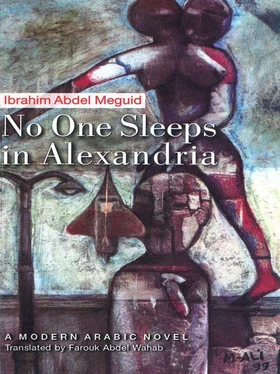“So you fast forty-three days a year?” Magd al-Din asked him.
“Oh, Sheikh Magd,” Dimyan laughed. “Almost the whole year is a fast. You have one month of fasting — we have several. It’s an agony made bearable by poverty, which makes fasting the rule, not the exception.”
After a moment he added, “Sometimes I think the fast goes back to the days of persecution. Take Lent, for instance — a fifty five day fast, and the most important because it was observed by Lord Jesus Christ Himself. He fasted for only forty days, but we’ve added two weeks to it — one week before the forty days to prepare ourselves for it, and the other one after as a symbol of Christ’s Passion.”
“Dimyan, you’re a devil!” Magd al-Din smiled.
After a pause, Dimyan asked, “Will you visit me the day after tomorrow? We’re having a holiday, Christmas.”
Magd al-Din was truly touched and decided to visit him more than once during the holiday. He heard Dimyan murmur, “Glory to God in the highest and peace on earth to men of good will.”
That night he told Zahra about the whole conversation, and she realized the reason Coptic cooking smelled differently from Muslim food: “They fast all the time and they cook with oil — their whole life is an ordeal! God Almighty forgive me.”
Camilla told Zahra, almost jumping for joy, “We’re going to the mass, Zahra. It means prayer. We will sing praises to the Lord and say hallelujah and meet our friends!”
Zahra was surprised and baffled by what Camilla said, but figured it must be real and beautiful, because the mother and Yvonne also smiled. Zahra did not know why she was overcome by the urge to go with them to church, but her face turned pale for a moment at the unusual thought. She shook hands with them again, then heard Sitt Lula’s voice and decided to spend some time with her. Magd al-Din was out late today. Maybe he had found a new job, since work here usually began early in the morning and did not end before seven in the evening.
The Christian holiday continued. It rained so hard on Epiphany that it seemed like the sky was just dumping huge buckets of water onto the earth. At night Zahra sat with Sitt Maryam, her daughters, and Lula, chewing sugar cane. Zahra discovered that the Christians did that just like the Muslims. Yvonne said confidently, “This is an ancient Egyptian custom— it’s neither Islamic nor Christian. Our ancestors, the pharaohs, used to chew sugar cane on this occasion. It happens to coincide with the baptism of Lord Jesus Christ in the River Jordan. He was baptized by John. Do you know who he was, Zahra?”
“No, I don’t understand.”
Camilla laughed and said, “John is Yahya, son of Zakariya. Every day I hear Uncle Magd al-Din say when he recites the Quran, “O Zakariya, we bring you the good news of a son whose name is Yahya.”
Zahra appeared shocked by this girl, who had eavesdropped on Magd al-Din, as he recited the Quran in the evening in a very soft voice — but apparently they could hear it clearly.
“Let’s stick to sugar cane,” Lula said with a laugh. “We don’t understand anything.”
Khawaga Dimitri was working the night shift at the city garage. The Feast of the Sacrifice was approaching. Lula said with joy in her voice, “May God make every day a holiday!” The rain began to let up, and the black clouds stayed away. Yusuf Bey Wahbi’s play The Murderer ended its run at Brentania Theater in Cairo. A big counterfeiting ring was apprehended with thirty thousand one-pound notes. Cosmos Cinema screened a new film featuring the singer Malak, Back to the Countryside. The Egyptian government sent the victims of the earthquake in Turkey twenty-four hundred wool blankets and vaccines for fifty thousand people. Dimyan said to Magd al-Din, “Do we have to have an earthquake here to get some blankets?” Then he smiled and said, “Dying of cold is better than dying in an earthquake, in any case.” Construction of the chest hospital in Abbasiya, Cairo, was completed. It was announced that the Czechoslovakian army was formed in France. The Feast of the Sacrifice passed, and no one from the village came to visit Magd al-Din. It had started the day after Epiphany, and there were some murmurs among the Muslims: the rains, a blessing for the Christians on Epiphany, would, if they continued, not be a blessing for the Muslims on their feast days. People were surprised to see the feast start on a clear day, on which the sun rose early, and the earth drank up the water that had been pouring down until the previous midnight. After wishing Magd al-Din a happy feast, Khawaga Dimitri told him, “God has bestowed his mercy equally among the people, Sheikh Magd.”
Magd al-Din was confused by this remark, especially because Dimitri had called him ‘Sheikh Magd.’ Dimitri explained that he was referring to how the rain had been pouring down non-stop for the last two days, Epiphany and the day before it, and it could have ruined the celebration of the Muslims’ feast — they would have had to stay home and not go out to pray and visit. But God saved the day.
“God be praised,” Magd al-Din assented. “Everything that comes from God is good.”
“I was kidding you,” Dimitri laughed. “I know you’re a good man and that you don’t treat Copts any differently from Muslims. This country. Sheikh Magd, has a slogan that goes back to the days of Saad Pasha Zaghloul: ‘Religion belongs to God, and the country belongs to everyone,’ but there are some bastards who like to kindle the fires of discord, especially in poor neighborhoods like ours.”
Magd al-Din fell silent. He remembered Bahi, who had told him that the strife between the Muslims and the Christians had greatly diminished.
“There’s always strife between different communities,” he finally said to Dimitri. “Somebody must have given our country the evil eye, Khawaga Dimitri. Thank God the war is keeping everybody preoccupied.”
The Feast of the Sacrifice was over. The Piaster Project Committee was still collecting donations for the Egyptian national industry in Cairo and the provinces. A new and unfamiliar type of mosquito descended upon Alexandria from the environs of Lake Maryut. The laboratory at the city’s Center for Epidemiology studied it, and concluded that it was not a mosquito but some kind of feeble fly that the cold weather would take care of, and that it did not pose any threat. And indeed the remaining days of the Coptic month of Tuba wiped it out. The Muwasa Society conducted its annual lottery. The Opera House dedicated its shows to the Commonwealth troops. Queen Farida and Queen Nazli were keen on attending these shows. News came that Charlie Chaplin had finished The Great Dictator. Muhammad Abd al-Wahhab’s film Happy Day was shown in Alexandria, and Camilla and Yvonne attended its last screening and told Zahra about penniless Abd al-Wahhab and the charming new child actress, Fatin Hamama. In the newspapers, Mrs. Aziza Amir thanked the Egyptian people for making her film The Workshop such a success and gave special thanks to the army and the art critics. Joint Egyptian-British maneuvers were conducted in the east at the eightieth kilometer on the Suez Road. Rita Hayworth was crowned Miss Hollywood for the year 1940. A new tomb dating back to 4500 B.C. was unearthed near Saqqara. King Farouk donated a movie projector for the entertainment of the troops and the people of Marsa Matruh. Three bodies were found in the Mahmudiya canal in the month of March. Among them was the body of the boy who spoke with a twang. The police apprehended the perpetrator, his own father, who had gone crazy. He also admitted to killing the mother. Magd al-Din stayed in his room for three days, blaming himself for the murder of the idiot boy, because he had not believed him the day he cried and said his father had killed his mother. Dimyan had advised him not to go to the police, saying that if there was a crime, it would be discovered. And it was, but it claimed the poor boy as its victim.
Читать дальше












